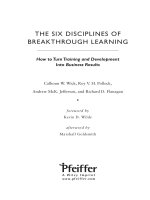Does social entrepreneurship affect to organizational learning and business partnership
Bạn đang xem bản rút gọn của tài liệu. Xem và tải ngay bản đầy đủ của tài liệu tại đây (134.41 KB, 6 trang )
International Journal of Management (IJM)
Volume 11, Issue 1, January 2020, pp. 107–112, Article ID: IJM_11_01_011
Available online at />Journal Impact Factor (2019): 9.6780 (Calculated by GISI) www.jifactor.com
ISSN Print: 0976-6502 and ISSN Online: 0976-6510
© IAEME Publication
Scopus Indexed
DOES SOCIAL ENTREPRENEURSHIP AFFECT
TO ORGANIZATIONAL LEARNING AND
BUSINESS PARTNERSHIP
Catur Susanto*
Student of Doctoral, Barawijaya University, Indonesia
Taher Alhabsji, Wilopo, Yusri Abdillah
Lecturer, Brawijaya University, Indonesia
*Corresponding Author Email:
ABSTRACT
This paper targets at presenting examna affecting does social entrepreneurship
organizational learning and business partnership with 168 respondent small medium
entrepreneurs The sample of this study are 168 small scale business oriented apparel
industry oriented creative industries in DKI Jakarta. The sampling technique is
through the Slovin formula. Sources of data obtained through questionnaires and
supported by field documentation. From the results of data acquisition, then analyzed
through: (i) descriptive statistics; and (ii) inferential statistics through GSCA
(Structured Generalized Component Analysis). The results of this study found that: (i)
social entrepreneurship has a significant effect on organizational learning; (ii) social
entrepreneurship has a significant effect on partnerships.
Keywords: Social Entrepreneurship, Organizational Learning, Partnership.
Cite this Article: Catur Susanto, Taher Alhabsji, Wilopo, Yusri Abdillah, Does Social
Entrepreneurship Affect to Organizational Learning and Business Partnership,
International Journal of Management (IJM), 11 (1), 2020, pp. 107–112.
/>
1. INTRODUCTION
SME has an important role for the economy, including: (i) as a support and driving force of
the real sector; (ii) job creation; (ii) capital creator; (iii) contribute to exports; (iv) poverty
reduction; and (v) able to reduce inequality between regions. However, MSMEs are also faced
with various problems, such as high levels of competition and high risk of business failure.
These problems are categorized as difficulties in governance, especially the weak nature of
cooperation between SMEs. Various empirical studies prove that the main factors determining
the success of MSME are determined by the application of strategic management, such as
organizational learning, partnerships, competitive advantage, and business performance.
Some of these aspects are categorized as forming aspects of social entrepreneurship entities
/>
107
Does Social Entrepreneurship Affect to Organizational Learning and Business Partnership
(social entrepreneurship). However, there is still debate whether social entrepreneurship is
truly able to be a determining factor for the success of MSMEs.
2. LITERATURE REVIEW
Understanding the effect of social entrepreneurship on organizational learning can be seen
from the opinion expressed by Kirzner (1973) which states that entrepreneurs can see
opportunities for entrepreneurial profit. Opportunities are considered imperfect market
participants' knowledge, and they can be captured by anyone who discovers their whereabouts
before others do. Thus, according to Kirzner, the opportunity requires differential access to
existing information. By responding to this, people can obtain resources and put them back
together to sell the results in the hope of making a profit (Shane, 2003).
Godói-de-Sousa and Júnior (2013) conducted a study on "Social Enterprises in Brazil:
Socially Produced Knowledge Versus Social Innovation" which aims to investigate whether
socially generated knowledge in social enterprises in Brazil has promoted social innovation
and regional development. This research is exploratory and descriptive in nature, and was
developed in two stages. Initially, the sample group consisted of 378 projects selected from
the Solidarity Economic Enterprises mapping, conducted by the National Secretary for
Solidarity Economics. The sample was surveyed to verify the main characteristics of the
company. After that, interviews were conducted with key managers in a sample of 32
projects.
Research results show not easily propose a model or uniformity of action to disseminate
learning in the context of third sector organizations which aims to social innovation. Each has
its own logic and before carrying out the analysis, it is necessary to recognize the individuals
who participate in it and their goals and thus understand the goals of the organization and the
dynamics of learning.
2.1. Proposition 1: Social Entrepreneurship Effect Organizational Learning
Social Entrepreneurship and Business Partnership
Brady and Haugh (2008) conducted research related to social entrepreneurship and business
networks. Based on theoretical descriptive studies show that the structure of concepts, ties,
content, context, and objectives identified from the theory can be applied to the analysis of
social enterprise networks. This shows that social enterprises can encourage business
partnerships. Through social enterprise partnerships will be stronger in the face of the fierce
business competition.
Nelson and Jenkins (2006) tried to conduct research on potential partnerships between
corporations and social entrepreneurs. The results of his research show that in periods of
economic and political change and uncertainty, business budgets tend to be tight and
community needs are high, there are greater incentives than before for companies,
communities and public officials to work together to utilize social and commercial investment
as effectively and efficiently as possible. Umi Karomah Yaumidin (2013) conducted a
research on the challenges of multi-sector and multi-dimensional synergy between social
entrepreneurship and corporate social responsibility. The results of his research show the
distribution of corporate social responsibility programs based on social entrepreneurship
triggers partnerships between companies and the community. The partnership built with the
program is expected to be able to answer the challenges of multi-sector and multi-dimensional
synergy between social entrepreneurship and social responsibility
/>
108
Catur Susanto, Taher Alhabsji, Wilopo, Yusri Abdillah
2.2. Proposition 2: Social Entrepreneurship and Business Partnership
Organizational
Learning
Social
Entrepreneurship
Business
Partnership
Figure 1 Conceptual Model of the Study
3. FINDING AND DISCUSSION
Table 1
Variable
Social
Extrepreneurship (X1)
X1,1
X1,2
X1,3
X1,4
Organizational
Learning
Y1,1
Y1,2
Y1,3
Y1,4
Business Partnership
Y2,1
Y2,2
Y2,3
Y2,4
Loading
Weight
SMC
Estimate SE CR Estimate SE CR Estimate SE
CR
AVE = 0,595, Alpha =0,770
0,737
0,807
0,783
0,756
0,043 17,18
0,033 24,66
0,035 22,15
0,038 19,92
0,270
0,357
0,320
0,347
0,035 7,69
0,027 13,48
0,026 12,21
0,028 12,3
0,543
0,651
0,614
0,571
0,063
0,052
0,055
0,057
8,62
12,54
11,19
10,03
0,041
0,067
0,064
0,083
17,34
8,78
8,75
4,99
0,054
0,046
0,051
0,074
12,36
14,48
13,58
6,63
AVE = 0,568, Alpha =0,741
0,844
0,766
0,750
0,643
0,819
0,814
0,834
0,699
0,024 34,66
0,045 17,1
0,043 17,31
0,065 9,87
0,350
0,326
0,302
0,356
0,037 9,42
0,030 10,97
0,027 11,11
0,033 10,72
0,712
0,587
0,562
0,413
0,033 24,46
0,028 28,84
0,031 26,77
0,055 12,77
AVE = 0,629, Alpha =0,791
0,288 0,026 10,98 0,671
0,334 0,030 11,29 0,663
0,368 0,023 16,07 0,695
0,264 0,024 10,9 0,489
Known variables of Social Entrepreneurship (X1) have a positive influence on
Organizational Learning (Y1), meaning that the higher the Social Entrepreneurship (X1), the
result will be to elevate the Organizational Learning variable (Y1), where the Path coefficient
obtained is 0.652 with a CR value of 11.52. Because the CR value is greater than the critical
value (11.52> 1.96), the statistical hypothesis states that H0 is rejected, meaning that the
variable Social Entrepreneurship (X1) has a Significant influence on the Organizational
Learning variable (Y1).
/>
109
Does Social Entrepreneurship Affect to Organizational Learning and Business Partnership
It is known that the variable Social Entrepreneurship (X1) has a positive effect on
Partnership (Y2), meaning that the higher the Social Entrepreneurship (X1) will consequently
elevate the Partnership variable (Y2), where the Path coefficient obtained is 0.275 with a CR
value of 2 , 2. Because the CR value is greater than the critical value (2.2> 1.96), the
statistical hypothesis states that H0 is rejected, meaning that the variable Social
Entrepreneurship (X1) has a Significant influence on the Partnership variable (Y2).
4. CONCLUSIONS
Hypothesis 1 suspects that the variable Social Entrepreneurship (X1) has a significant positive
effect on the variable Organizational Learning (Y1). Statistical test results show that there is a
significant influence between the variables Social Entrepreneurship on Organizational
Learning. A variety of previous studies support these findings, where the arguments most
widely proposed because of training and development as a social entrepreneurial commitment
proved to have a strong influence on increasing employee self-awareness of the performance
achieved. Self-awareness can strengthen organizational learning management. 2. Hypothesis 2
suspects that the variable Social Entrepreneurship (X1) has a significant positive effect on the
Partnership variable (Y2). The results of statistical tests show that there is a significant
influence between the variables Social Entrepreneurship on Partnerships. A variety of
previous studies support these findings, where the arguments most widely proposed because
the distribution of corporate social responsibility programs can trigger partnerships between
companies and communities. In the case of MSMEs, these activities are usually carried out on
the awareness of the owner of the company of the importance of sharing knowledge with
fellow MSMEs. In such a context, there is a tendency that fellow MSMEs will form a series
of partnership networks.
5. SUGGESTION
Based on the results of the analysis of the discussion, the suggestions of this study are as
follows: This study found that the application of the concept of social entrepreneurship in the
case of MSMEs proved to have implications on several variables of competition and strategic
management, both for organizational learning, partnerships, competitiveness, and business
performance. The relationship between endogenous and exogenous variables is also positive,
which indicates that all of these variables work in harmony and have mutual implications.
Therefore, the strategy for developing MSMEs in the future must pay attention to the
principles of social entrepreneurship, which are expected to have an impact on optimizing
organizational learning, partnership strategies, competitive advantage, and improving business
performance.
REFERENCES
[1]
Austin, J., Stevenson, H.,& Wei-Skillern, J, Social Entrepreneurship and Commercial
Entrepreneurship: Same, Different, or Both?. Working Paper Series Harvard Business
School (04-029), 2003
[2]
Azim, M.D.S., Abdullah, H.H., Gorondutse, A.H, Competitive Strategy and Firm
Performance: A Review of Literature. International Journal of Business and
Tecchnopreneurship7 (1), 2017, pp 87-92.
[3]
Barney, J. B., & Wright, P. M, On Becoming a Strategic Partner : The Role of Human
Resource in Gaining Competitive Advantage. Human Resources Management, 37(1),
1998, pp 31-46.
/>
110
Catur Susanto, Taher Alhabsji, Wilopo, Yusri Abdillah
[4]
Bauer, M., Chytilova, J.,&Morduch, J, Behavioral Foundations of Microcredit:
Experimental and Survey Evidence from Rural India. American Economic Review 102(2),
2012, pp 1118–1139.
[5]
Beaudreau, B.C, A Humanistic Theory of Economic Behavior. The Journal of SocioEconomics 41, 2012, pp 222-234.
[6]
Bongo, I., Arena, M., Azzone, G., & Calderini, M, Indicators and Metrics for Social
Business: A Review of Current Approaches. Journal of Social Enterpreneurship 7 (1),
2016, pp 1-24.
[7]
Bornstein, D, How to change the world: Social Entrepreneurs and the Power of New
Ideas. Oxford University Press: USA, 2007
[8]
Boyd, B. K., Gove, S.,& Hitt, M. A, Consequences of Measurement Problems in Strategic
Management Research: The Case of Amihud and Lev. Strategic Management Journal
26(4), 2005, pp 367-375.
[9]
Defourny, J.,& Nyssens, M, Social enterprise in Europe: recent trends and developments.
Social enterprise journal 4(3), 2008, pp 202-228.
[10]
Denison, Daniel R, Corporate Culture and Organizational Effectiveness.Wiley Series on
Organizational Assessment and Change. Oxford, England, 1990
[11]
Dess, G.G., Lumpkin, G.T,& Taylor, M, Strategic Management: Text and Cases.
McGraw-Hill Higher Education: New York, 2004
[12]
Dobele, L.,& Pietere, A, Competitiveness of Social Entrepreneurship in Latvia. Regional
Formation and Development Studies 17(3), 2015, pp 40-50.
[13]
Doherty, B., Haugh, H.,& Lyon, F, Social Enterprises as Hybrid Organizations: A Review
and Research Agenda. International Journal of Management Reviews 4 (1), 2014, pp 450461.
[14]
Godói-de-Sousa, E., & Júnior, V.M.V, Social Enterprises in Brazil: Socially Produced
Knowledge Versus Social Innovation. Journal of Technology Management &
Innovation5, 2013, pp 166-176.
[15]
Dr P V Raveendra, Padmalini Singh and Arun Kumar DC, Social Entrepreneurship and
CRM: Linking Through Common Factors, International Journal of Mechanical
Engineering and Technology, 9(4), 2018, pp. 733–740
[16]
Goyal, S.K.,& Giri, B.C, Recent Trends in Modelling of Deteriorating Inventory.
European Journal of Operational Research 134 (8), 2001, pp 1-16.
[17]
Grassl, W, Business Models of Social Enterprise: A Design Approach to Hibridity. ACRN
Journal of Entrepreneurship Perspective 1 (1), 2012, pp 37-60.
[18]
Hashim, N.A.B., Raza, S.,& Minai, M.S, Relationship between Entrepreneurshiial
Competencies And Small form Performance: Are Dynamic Capabilities the Missing
Link?. Academy of Strategic Management Journal7 (2), 2018, pp 1-10.
[19]
Dr. Sanjeev Kumar, Sanchita Raghav, Apoorva Raj, Ankit Tiwari and Mohan Gautam,
Social Innovation and Social Entrepreneurship - An Elucidation for the Problems of
Modern Society. International Journal of Management, 8(1), 2017, pp. 212–217
[20]
Hobday, M, The electronics industries of the Asia-Pacific: Exploring International
Production Networks for Economic Development. Asian-Pacific Economic literature.15
(1), 2001, pp 13–29.
[21]
Huang, Y. T, Learning from Cooperative Inter-Organizational Relationships: The Case of
International Joint Venture. Journal of Business & Industrial Marketing 25(6), 2010, pp
454-467.
/>
111
Does Social Entrepreneurship Affect to Organizational Learning and Business Partnership
[22]
Indrawati, S, SME’s Product Investment Priority and Selection Based on Local
Competencies. Procedia Economics and Finance4 (4), 2012, pp 59-67.
[23]
Andriyansah, Femilia Zahra Student Awareness towards Social Entrepreneurship: A
Qualitative Study. International Journal of Civil Engineering and Technology, 8(6), 2017,
pp. 457–464.
[24]
Jennings, P.D., Greenwood, R., Lounsbury, M.D., Suddaby, R, Institutions, Entrepreneurs,
and Communities: A Special Issue on Entrepreneurship. Journal of Business
Venturing.28, 2013, pp 1-9.
[25]
Jones, T. M, Shareholder suits: Good News and Bad News for Corporate Executives.
California Management Rev23, 1981, pp 77–86.
[26]
Lewis, W.G., Pun, K.F., and Lalla, T.R.M, Exploring Soft Versus Hard Factors for TQM
Implementation in Small and Mediumsized Enterprises, International Journal of
Productivity and Performance Management, 55(7), 2006, pp 539-554.
[27]
M. Malarkodi and Dr. Saifil Ali,Women Social Entrepreneurship and its Impact on
Entrepreneurial Performance. International Journal of Management, 9 (1), 2018, pp. 10–
15
[28]
Li, S., Ragu-Nathan,B., Ragu-Nathan, T.S., & Subba Rao, S, The Impact of Supply Chain
Management
Practise
on
Competitive
Advantage
and
Organizational
PerformanceOmega34(1), 2006, pp 107 – 124
[29]
MacKinnon, D., Cumbers, A., & Chapman, K, Learning, Innovation and Regional
Development: A Critical Appraisal of Recent Debates. Progress in Human Geography 26,
2002, pp 293-311.
[30]
Mainsah, E., Heuer, S., Kalra, A., & Zhang, Q, Grameen Bank: Taking Capitalism to the
Poor. Columbia Business School: New York, 2004
[31]
Rastislav, R., & Silvia, L, Strategic Management of Business Performance Based on
Innovations and Information Support in Specific Conditions of Slovakia. Journal of
Competitiveness7 (1), 2015, pp 3-21.
[32]
Prof. T A Venlatalachalam, Dr. G. Sivaramakrishnan, Social Entrepreneurship in Indian
Scenario, International Journal of Management, 2 (1), 2011, pp. 58–60
[33]
McQuaid, R. W, The Theory of Partnership: Why Have Partnerships?. Routledge
Advances in Management and Business Studies 19, 2000, pp 9-35.
[34]
Mercader, V, Influence of Social Enterpreneurship in Organization, Family, and Society:
Causes and Solutions for Success. American Journal of Management 17 (2), 2017, pp 6577.
[35]
Mohtar, H.L; & Mohtar, S. 2015. Social Enterpreneurship: a Different Perspective.
International Academic Research Journal of Business and Technology1 (1), 2015, pp 915.
/>
112









